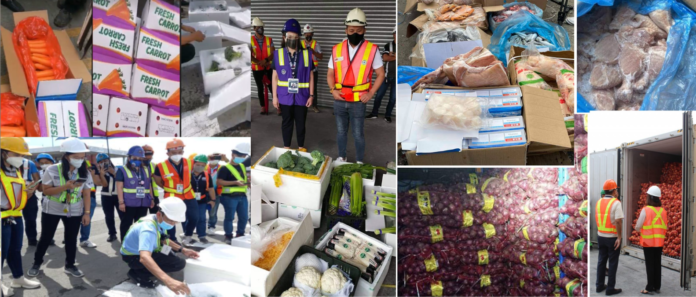-
DA puts in place measures to curb agricultural smuggling
-
They include requiring importers to report actual volume utilized for each sanitary and phytosanitary import clearance issued
-
The surrender of unused SPICs and importers’ consent to unannounced visits to storage facilities are some of the other measures
-
Recent congressional hearings on agricultural smuggling noted lapses in DA’s process of issuance of import clearances and in the inspection of imported agricultural products
The Department of Agriculture (DA) will implement measures to curb agricultural smuggling, including requiring importers to report actual volume utilized for each sanitary and phytosanitary import clearance (SPSIC) issued.
The surrender of unused SPSICs upon expiration, and reporting utilization of agricultural products to prevent diversion to unintended uses are some of the other measures under DA Memorandum Order (MO) No. 31 series of 2022, dated April 26.
DA said these can be part of requirements when processing new SPSIC applications of importers.
The issuance of MO No. 31 follows recent congressional hearings on agricultural smuggling where lapses in DA’s process of issuance of SPSIC and in the inspection of imported agricultural products were noted.
Signed by DA officer-in-charge and undersecretary Leocadio Sebastian, MO No. 31 is addressed to heads of DA agencies, Bureau of Plant Industry (BPI), Bureau of Animal Industry (BAI), Bureau of Fisheries and Aquatic Resources (BFAR).
Lapses
Lapses that surfaced during the congressional hearings include lack of monitoring on the utilization of issued SPSICs (which SPSICs are not being utilized and which volume applied is underutilized); and concerned agencies not monitoring utilization of imported agricultural products as intended.
There are also allegations of corruption from importers during inspections and when imported agricultural products are placed on hold.
In addition, the Bureau of Customs (BOC) observed staff of DA agencies’—BPI, BAI, and BFAR—are not always present during X-ray inspection of agricultural shipments.
Lastly, DA said there is improper application of rules and procedures and hierarchy of authority in the apprehension, investigation, appeal process, and approval of decisions among inspecting officials, supervisors, regulatory unit heads and bureau heads.
READ: DA pushes 2-pronged approach to curb agri smuggling
New requirements
As condition in the issuance of SPSICs, MO No. 13 is requiring consent from importers for unannounced visits to storage facilities to ensure compliance with food safety and health requirements.
All concerned staff transacting business with importers and customs brokers may only do so within office premises, and in full view and within hearing distance of other staff. Violators face immediate relief or reassignment.
BPI, BAI, and BFAR staff will be assigned to BOC’s X-ray area 24/7.
MO No. 13 said DA agencies should conduct regular orientation for and assessment of performance of all staff involved in the quarantine and regulatory offices; and come up with unified guidelines on inspection, apprehension, investigation, appeal process, and approval of decisions.
Lastly, the concerned bureaus should adopt automation in inspection, reporting, and monitoring processes.
Agriculture Secretary William Dar earlier called on lawmakers to provide budgetary support that would allow DA and BOC to transition to a centralized digital system to fight smuggling, saying this would address discrepancies in data on agricultural shipments.
“If everything is automated, and there’s less human intervention, there is transparency at all levels of transactions,” Dar said.
DA assistant secretary for the DA-Wide Field Inspectorate Federico Laciste, Jr., in a Senate hearing admitted that DA’s database is not yet centralized and has no way of monitoring agricultural imports that have arrived against volume covered by the issued sanitary and phytosanitary import clearances. He said this is why DA and BOC data on agricultural imports do not tally.





